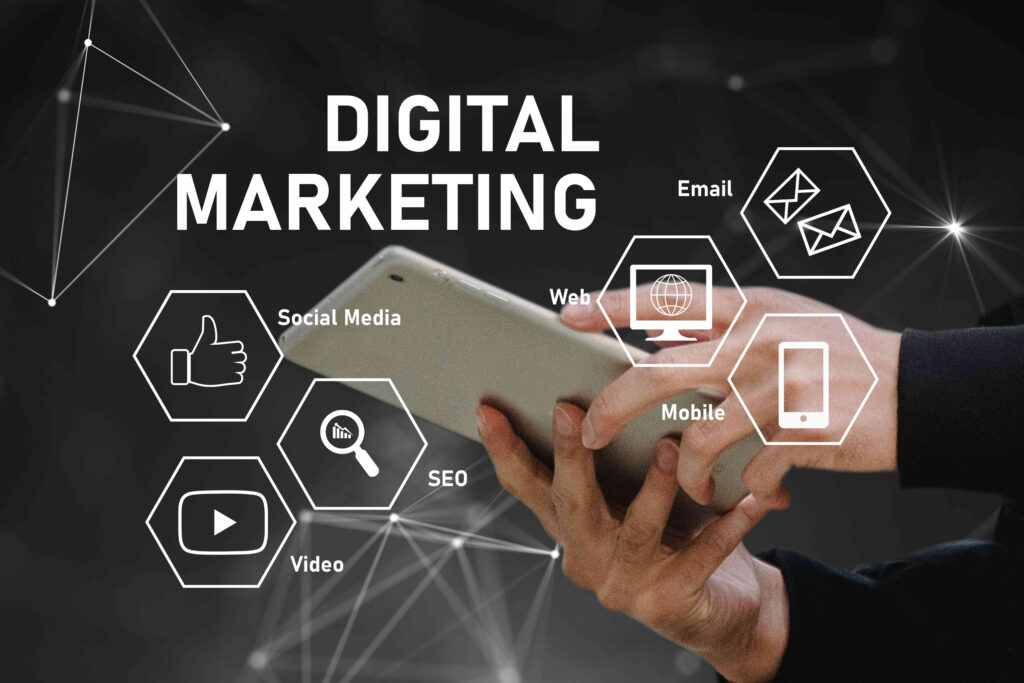Introduction
In the ever-evolving landscape of digital marketing, staying ahead of the curve is crucial for businesses aiming to maintain a competitive edge. As we step into 2024, the digital marketing arena is poised for significant transformations driven by technological advancements, changing consumer behaviors, and innovative strategies.
The rapid pace of change in digital marketing means that what worked yesterday might not be as effective today. Businesses that fail to adapt to these changes risk falling behind their competitors. Therefore, understanding and leveraging the latest trends is not just beneficial but essential for survival and growth in the digital age.
This year, we are witnessing the convergence of several powerful trends that are set to redefine how brands connect with their audiences. From the rise of artificial intelligence and machine learning to the growing importance of voice search optimization, the digital marketing landscape is becoming more complex and interconnected. Additionally, the emergence of the metaverse, the continued dominance of video marketing, and the increasing focus on data privacy and security are shaping the future of digital marketing.
Moreover, consumers are becoming more discerning and demanding, expecting personalized experiences and ethical practices from the brands they engage with. This shift in consumer expectations is driving businesses to innovate and adopt more sophisticated marketing strategies.
In this blog, we will delve into the top digital marketing trends of 2024, exploring how these trends can help your business stay competitive and reach your target audience more effectively. We will provide insights and strategies to help you navigate this dynamic environment, ensuring that your marketing efforts are not only current but also impactful.
Whether you are a seasoned marketer or a business owner looking to enhance your digital presence, understanding these trends will equip you with the knowledge and tools needed to thrive in the ever-changing digital landscape. So, let’s dive in and explore the exciting digital marketing trends that will shape 2024 and beyond.
| Year | Key Trends and Developments |
|---|---|
| 2018 | – Rise of influencer marketing<br>- Growth of video content, especially live streaming<br>- Increased focus on mobile-first strategies |
| 2019 | – Expansion of AI and chatbots in customer service<br>- Popularity of ephemeral content (e.g., Instagram Stories)<br>- Voice search optimization begins to gain traction |
| 2020 | – Surge in e-commerce due to the COVID-19 pandemic<br>- Increased use of data analytics and personalization<br>- Growth of social commerce and shoppable posts |
| 2021 | – Continued dominance of video marketing, including short-form videos<br>- Greater emphasis on data privacy and security<br>- Rise of augmented reality (AR) in marketing campaigns |
| 2022 | – Emergence of the metaverse and virtual experiences<br>- Increased adoption of AI for predictive analytics<br>- Growth of sustainability and ethical marketing practices |
| 2023 | – Further integration of AI and machine learning in marketing<br>- Expansion of voice search optimization<br>- Continued growth of social commerce and in-feed shopping |
| 2024 | – AI and machine learning revolutionizing customer service and personalization<br>- Voice search optimization becoming essential<br>- Metaverse offering new opportunities for brand engagement<br>- Social commerce streamlining the purchasing process<br>- Personalization and customer experience at the forefront<br>- Video marketing, especially short-form videos, dominating<br>- Data privacy and security becoming increasingly important<br>- Sustainability and ethical marketing gaining traction |
1. The Rise of AI and Machine Learning
Artificial Intelligence (AI) and Machine Learning (ML) continue to revolutionize digital marketing. These technologies enable businesses to automate processes, personalize customer interactions, and make data-driven decisions.
- AI in Customer Service: AI-powered chatbots are becoming more sophisticated, providing instant, 24/7 customer support. They can handle a wide range of queries, freeing up human agents for more complex issues.
- Personalized Marketing Campaigns: Machine learning algorithms analyze customer data to deliver highly personalized content and recommendations. This increases engagement and conversion rates.
- Predictive Analytics: By analyzing historical data, predictive analytics can forecast future trends and customer behaviors, allowing businesses to make proactive decisions.
Image Suggestion: Diagram showing AI integration in marketing.

2. Voice Search Optimization
With the proliferation of voice-activated devices like smart speakers and virtual assistants, optimizing for voice search is becoming essential.
- Voice Search Usage: More consumers are using voice search for convenience, making it crucial for businesses to adapt their SEO strategies.
- Content Optimization: To rank for voice search, content should be conversational and answer common questions directly. Long-tail keywords and natural language are key.
- Impact on SEO: Voice search changes the way people search, often using longer, more conversational queries. This requires a shift in keyword strategy and content creation.
Image Suggestion: Infographic on voice search statistics.
3. The Emergence of the Metaverse
The metaverse is a virtual world where users can interact with digital environments and other users in real-time. It presents new opportunities for brands to engage with their audiences in immersive ways.
- Understanding the Metaverse: The metaverse encompasses virtual reality (VR), augmented reality (AR), and other immersive technologies. It offers a new frontier for marketing and brand experiences.
- Brand Opportunities: Brands can create virtual stores, host events, and offer unique experiences in the metaverse. This can drive engagement and brand loyalty.
- Successful Campaigns: Case studies of brands that have successfully leveraged the metaverse can provide inspiration and insights for your own strategies.
Image Suggestion: Screenshot of a popular metaverse platform.
4. Social Commerce and In-Feed Shopping
Social commerce, the integration of e-commerce with social media platforms, is on the rise. It allows consumers to shop directly within their social media feeds, streamlining the purchasing process.
- Growth of Social Commerce: Platforms like Instagram, Facebook, and TikTok are enhancing their shopping features, making it easier for users to discover and purchase products.
- Benefits for Businesses: Social commerce reduces friction in the buying process, increases impulse purchases, and provides valuable data on consumer behavior.
- Setting Up Social Commerce: Tips for businesses to set up and optimize their social commerce presence, including product tagging, shoppable posts, and influencer partnerships.
Image Suggestion: Example of an in-feed shopping post.
5. Personalization and Customer Experience
Personalization remains a key driver of customer satisfaction and loyalty. In 2024, businesses are expected to take personalization to new heights.
- Importance of Personalization: Personalized marketing messages resonate more with consumers, leading to higher engagement and conversion rates.
- Tools and Techniques: Utilizing data analytics, CRM systems, and AI to deliver personalized content, offers, and experiences.
- Enhancing Customer Experience: Tailoring the customer journey based on individual preferences and behaviors to create a seamless and enjoyable experience.
Image Suggestion: Flowchart of a personalized marketing funnel.
6. Video Marketing: A Continuing Trend
Video content continues to dominate digital marketing. Short-form videos, in particular, are gaining popularity across platforms like TikTok, Instagram Reels, and YouTube Shorts.
- Popularity of Short-Form Videos: These videos are engaging, easy to consume, and highly shareable, making them ideal for capturing audience attention.
- Creating Engaging Content: Tips for creating compelling video content, including storytelling, high-quality production, and incorporating trends.
- Measuring Success: Metrics to track the performance of video marketing campaigns, such as views, engagement, and conversion rates.
Image Suggestion: Thumbnail of a popular marketing video.
7. Data Privacy and Security
As data breaches and privacy concerns continue to make headlines, businesses must prioritize data privacy and security in their digital marketing strategies.
- Growing Concerns: Consumers are becoming more aware of how their data is used and are demanding greater transparency and control.
- Regulations and Compliance: Understanding and complying with regulations like GDPR and CCPA is essential for building trust and avoiding penalties.
- Best Practices: Implementing robust data security measures, being transparent about data usage, and providing options for consumers to manage their data.
Image Suggestion: Iconography representing data security.
8. Sustainability and Ethical Marketing
Consumers are increasingly favoring brands that demonstrate a commitment to sustainability and ethical practices. This trend is expected to grow in 2024.
- Consumer Preferences: More consumers are choosing brands that align with their values, particularly regarding environmental and social responsibility.
- Incorporating Sustainability: Strategies for integrating sustainability into marketing efforts, such as eco-friendly packaging, ethical sourcing, and promoting sustainable practices.
- Leading by Example: Highlighting brands that are leading the way in ethical marketing and the positive impact they are making.
Image Suggestion: Green marketing campaign example.
Conclusion
As we navigate through 2024, the digital marketing landscape continues to evolve at a rapid pace, presenting both challenges and opportunities for businesses. The trends discussed in this blog are not just fleeting fads but are indicative of deeper shifts in technology, consumer behavior, and market dynamics. Embracing these trends can provide your business with a significant competitive advantage, enabling you to connect with your audience in more meaningful and impactful ways.
The rise of AI and machine learning is transforming how we approach customer service, personalization, and predictive analytics. By leveraging these technologies, businesses can automate routine tasks, deliver highly personalized experiences, and make data-driven decisions that enhance their marketing strategies. Voice search optimization is another critical area, as the increasing use of voice-activated devices changes the way consumers search for information. Adapting your SEO strategies to accommodate voice search can improve your visibility and reach.
The emergence of the metaverse offers a new frontier for brand engagement, allowing businesses to create immersive and interactive experiences that captivate their audiences. Social commerce and in-feed shopping are streamlining the purchasing process, making it easier for consumers to buy directly from their social media feeds. This trend not only boosts sales but also provides valuable insights into consumer behavior.
Personalization and customer experience remain at the forefront of digital marketing. By utilizing advanced tools and techniques, businesses can tailor their marketing efforts to meet the unique needs and preferences of their customers, fostering loyalty and satisfaction. Video marketing continues to be a powerful tool for capturing attention and conveying messages effectively. Short-form videos, in particular, are gaining traction, offering a quick and engaging way to connect with audiences.
Data privacy and security are becoming increasingly important as consumers demand greater transparency and control over their personal information. Ensuring compliance with regulations and implementing robust security measures can build trust and protect your brand reputation. Additionally, the growing emphasis on sustainability and ethical marketing reflects a shift in consumer values. By adopting sustainable practices and promoting ethical behavior, businesses can resonate with socially conscious consumers and differentiate themselves in the market.
In conclusion, staying informed and adapting to these digital marketing trends is essential for businesses looking to thrive in 2024 and beyond. The key to success lies in being proactive, innovative, and customer-centric. Embrace these trends, experiment with new strategies, and continuously refine your approach based on feedback and results. By keeping your audience at the heart of your marketing efforts, you can build lasting relationships, drive growth, and achieve your business goals in the ever-changing digital landscape.
As you implement these trends, remember that the digital marketing landscape is dynamic and requires ongoing learning and adaptation. Stay curious, stay agile, and stay committed to delivering value to your customers. The future of digital marketing is bright, and with the right strategies, your business can shine brightly in 2024 and beyond.


Pingback: Neuromarketing Understanding Its Impact on Consumer Behavior